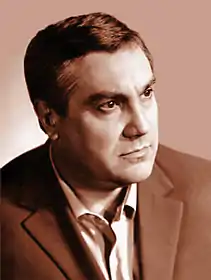Pavel Luspekayev
Pavel Borisovich Luspekayev (Russian: Па́вел Бори́сович Луспека́ев) (20 April 1927, Luhansk — 17 April 1970, Moscow) was a Soviet actor who is best known for his role of Vereschagin in the classic Russian movie White Sun of the Desert. Laureate of the State Prize of the Russian Federation (1997, posthumously).[1]
Pavel Luspekayev | |
|---|---|
 | |
| Born | Pavel Bogdasarovich Luspekan 20 April 1927 |
| Died | 17 April 1970 (aged 42) |
| Alma mater | Mikhail Shchepkin Higher Theatre School |
| Occupation | Actor |
| Years active | 1956–1970 |
Biography
Pavel Luspekayev was born in Luhansk, Ukrainian SSR in 1927. His father Bogdasar Luspekyan was an Armenian butcher from a village near Nakhichevan-on-Don (Russian city founded by Armenian settlers). His mother Seraphima Kovaleva came from Don Cossacks.[2][3] During the Great Patriotic War he joined the Soviet partisans at the age of 16 and fought shortly after with the 3rd Ukrainian Front. When his feet suffered severe frostbite, he had to be demobilised in 1944. Luspekayev's lower limbs never fully recovered.[4]
In 1945 Luspekayev became student in the Mikhail Shchepkin Higher Theatre School in Moscow. After finishing the school in 1950 he performed in Tbilisi's Griboedov Russian Drama Theatre, in 1956 in Kiev's Lesya Ukrainka National Academic Theater of Russian Drama. In 1959 he joined Leningrad's Bolshoi Drama Theatre where he performed in plays under director Georgy Tovstonogov. In 1965 Luspekayev was awarded the title of Meritorious Artist (Zasluzhenny aktyor) of RSFSR.[5]
The long-term effects of the suffered frostbite caused a peripheral vascular disease in Luspekayev's legs when he was 26. The illness progressed, and after he finished the movie The Republic of ShKID (1966) both of his legs had to be amputated just below the knees.[6]
Nevertheless, he continued to perform on prosthesis, even though he was suffering from pain. During filming of White Sun of the Desert in 1969, Luspekayev's condition worsened, and he could barely walk. His wife was carrying a small folding chair, and Luspekayev had to take a rest every 20 steps. In the original script, the role of Vereschagin was a minor one, but during filming, the role began to expand, with some of the scenes being improvised on the spot. The connection between the actor and the role he was playing became so strong, that the crew began to call Vereschagin by name Pavel (Pasha), even though in the script his name was Alexander.
Shortly after the White Sun of the Desert was released, Pavel Luspekayev died from a heart aneurysm. He was buried in the Northern Cemetery of Saint Petersburg.[7]
Personal life
He was married to a BDT actress Inna Kirillova. They had one daughter and two grandchildren.
Filmography
| Year | Title | Role | Notes |
|---|---|---|---|
| 1954 | Isini chamovidnen mtidan | Boris | |
| 1957 | Secret of two oceans (Тайна двух океанов) | Kartsev | |
| 1959 | Golubaya strela | Hachalnik shtaba flota | |
| 1960 | Ezop | Agnostos | |
| 1961 | Kochvatz en aprelu | Vazgen Aramyan | |
| 1961 | Baltic Sky (Балтийское небо) | Kuznetsov | |
| 1963 | Kapronovye seti | Stepan | |
| 1965 | Poyezd miloserdiya | Lutokhin - ranenyy | |
| 1965 | Zalp Avrory | ||
| 1965 | Na odnoy planete | Nikolai Markin | |
| 1966 | Going Inside a Storm (Иду на грозу) | ||
| 1966 | A Long Happy Life (Долгая счастливая жизнь) | Pavel | |
| 1966 | Three Fat Men (Три толстяка) | Gen. Karaska | |
| 1966 | The Republic of ShKID (Республика ШКИД) | Kostalmed | |
| 1967 | Na dikom brege | ||
| 1967 | Proisshestviye, kotorogo nikto ne zametil | Teterin | |
| 1969 | Rokirovka v dlinnuyu storonu | ||
| 1969 | Zavtra, tretyego aprelya... | ||
| 1969 | Eyo imya - Vesna | ||
| 1970 | White Sun of the Desert (Белое солнце пустыни) | Pavel Vereshchagin | |
| 1970 | Green Chains (Зелёные цепочки) | mayor Ivan Vasilyevich | |
| 1972 | Takaya dlinnaya, dlinnaya doroga (такая длинная длинная дорога) | Ivan Artamonov | (final film role) |
References
- Указ Президента РФ от 6.06.1998 № 656
- "Luspekayev Pavel Borisovich" (in Russian). To Be Remembered.
- "Offscreen" (in Russian). Gordon's Boulevard. Archived from the original on July 7, 2017. Retrieved April 17, 2012.
- Miller, Cynthia J.; Van Riper, A. Bowdoin (2013). International Westerns: Re-Locating the Frontier. Scarecrow Press. ISBN 978-0-810-89288-0. p.374
- Rollberg, Peter (2016). Historical Dictionary of Russian and Soviet Cinema. Rowman & Littlefield. ISBN 978-1-442-26842-5. p.459
- Smeliansky, Anatoly; Senelick, Laurence (1999). The Russian Theatre After Stalin. Cambridge University Press. ISBN 978-0-521-58794-5. p.53
- Луспекаев Павел Борисович (1927-1970) see: m-necropol.ru (Russ.)
External links
- Pavel Luspekayev at IMDb
- (in Russian) Pavel Luspekayev bio
- (in Russian) Vladimir Motyl's memoirs about Pavel Luspekayev